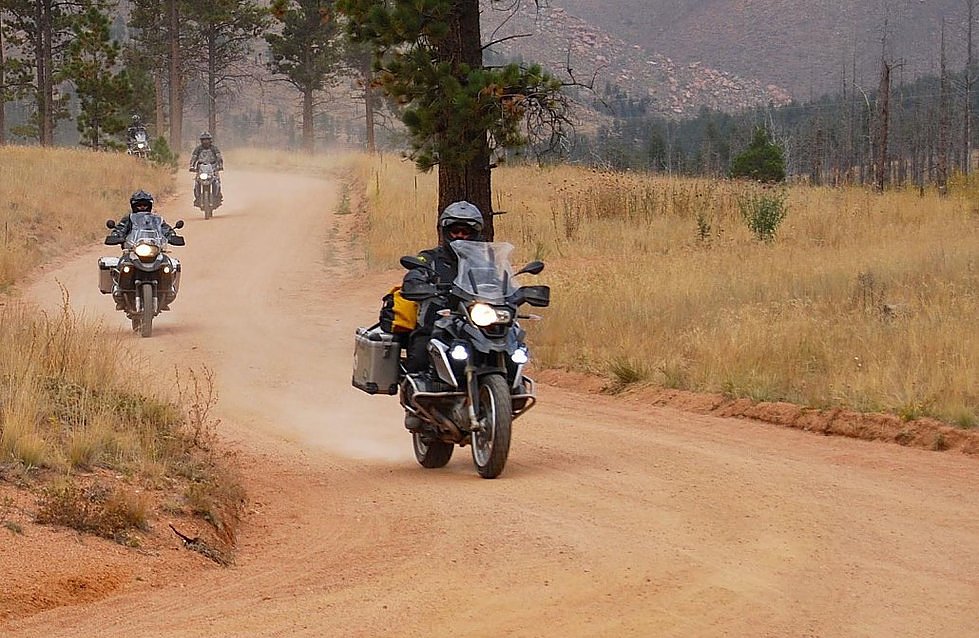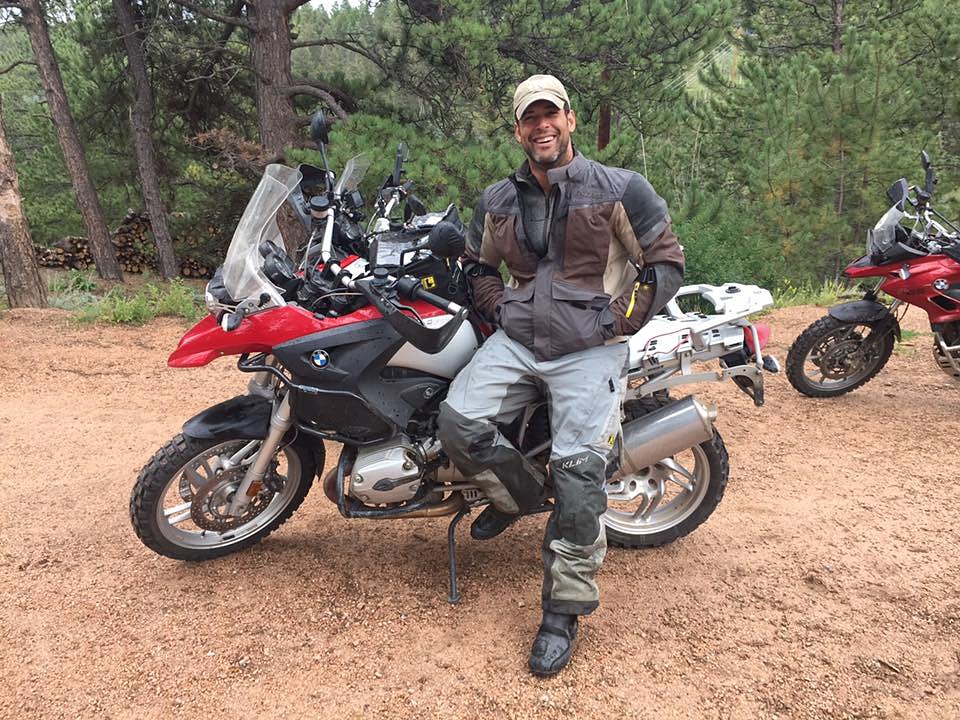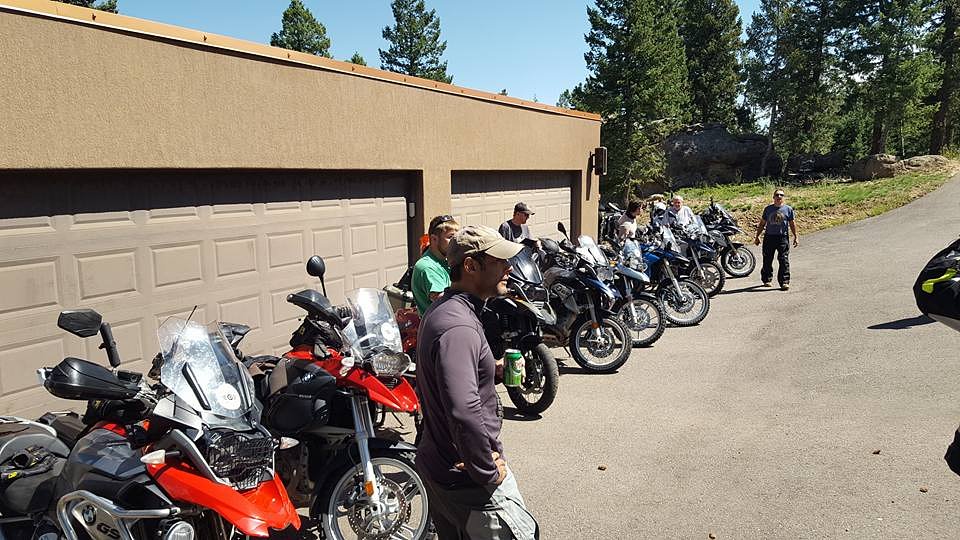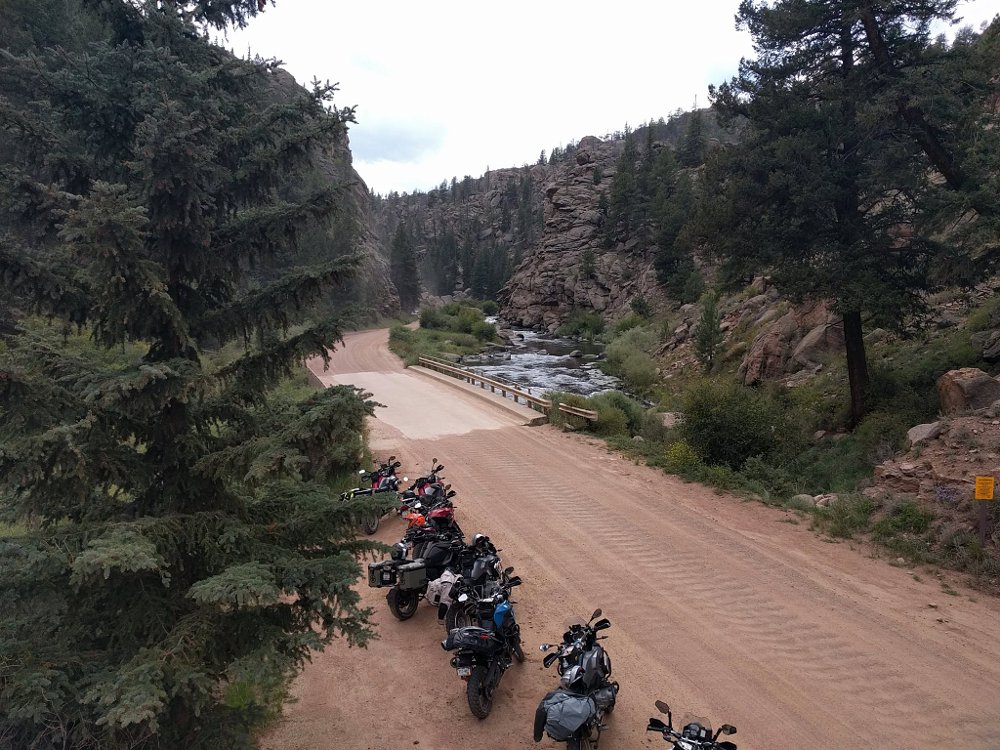Motorcyclists uniquely understand the “clearheadedness” that comes with heading out for a ride.
Long highway burns, blazing trails, or turning laps at the track, the riding experience takes our complete attention, shutting everything else out for as long as the engine’s running. What if that feeling could be used to heal? The Motorcycle Relief Project (MRP) built an entire program for veterans on that premise, and the results are extraordinary. Their guided ADV tours for vets inspire openness, bonding, and psychological relief.
RevZilla supports the Motorcycle Relief Project. Visit the non-profit organization's website to learn more about its program to help veterans or to donate.
Chris Diaz, a Navy veteran and clinical psychology Ph.D. student at Drexel University is an alumnus of MRP. He’s also a walking inspiration with a passion for service and adventure. Chris graciously agreed to an interview with Common Tread, where we talked psychology, empowering veterans, and of course, motorcycles.
Common Tread: Chris, it’s great to meet you. You’re a veteran, a rider, and you’re here in Philly at Drexel. Your accomplishments don’t stop there, though... you’ve even climbed Kilimanjaro?
Chris Diaz: I’m somebody who is reaching for the next adventure in the world, and that leads me to doing different things, whether that’s climbing the tallest mountain in Africa or spending a week riding a bike around in the woods. I find myself and understand myself deeper when those experiences challenge me.
CT: So you served six years in the Navy as a Fleet Marine Force Hospital Corpsman. What does that entail, exactly?
CD: It’s the Marine Corps’ version of an Army medic. Many people don't realize that the Marine Corps is under the Department of the Navy. As such, they don’t actually have their own medical personnel. So the Marine Corps chooses sailors with certain characteristics and attributes, and then they train them with the Marines. Those individuals, for all intents and purposes, leave the Navy for specialized training and go to work with the Marines hand in glove. If you can recall in your mind the famous image of raising the flag at Iwo Jima, there are five Marines in that photo, and there is one Navy corpsman. So wherever the Marines have gone in this world, the Navy corpsmen have been there with them. As a corpsman, you’re their brother, their doctor, their psychologist. You support them in everything.
CT: An experience like that has got to change a person’s life. Is this when you started seeking to change the lives of others through psychology?
CD: It was during my time in the military that I realized that psychology could really be this conduit for change, and beyond the traditional applications of treating psychopathology like depression, or anxiety, which are obviously these incredibly real issues that people face both in and outside of the military. There's also this part of psychology I was interested in. At the time I was thinking it might be sports psychology, but now I understand it to be performance psychology, which is the larger umbrella term where you’re working with individuals who need to apply themselves and excel. That’s where I work, at the intersection of military psychology and performance psychology. That’s where I carved out a niche for myself.

CT: Right now, you’re working on your Ph.D. in clinical psychology. What’s your focus there?
CD: My focus with psychology is really understanding and sharing the science of the mind and how the science of the mind influences our behaviors. Performance psychology is an emerging field that takes benefit from clinical psychology, neuropsychology, industrial and organizational psychology... It pulls from all these different components and facets to help individuals and organizations excel. For me, that means I’m more interested with high performers, primarily in sports and the military. And so I get to apply what I’ve come to learn and understand in a number of settings and different ways.
CT; How about your riding journey? How did you get started, and what are you riding now?
CD: My riding journey started on a 1985 [Yamaha] Maxim that my brother taught me how to ride before joining the Navy. I didn’t ride much while I was in. While sitting in Afghanistan, I was dreaming a) of being able to come back safely and b) that my first big purchase when I got back would be a bike. So I walked into a shop in North Carolina and saw the most incredible machine I had ever seen in my life, 1978 [BMW] R 100 S. I just fell for it. As a novice rider, I didn’t take care of her as well as I should have. It’s in a graveyard right now, but one day I hope to restore her. From there, I fell in love with the BMW [R 1200] GS. I now ride a 2005 GS 1200. She’s got about 43,000 miles on her.

CT: Do you have a favorite place to ride, or more of a favorite way to ride?
CD: The way I like to ride, I like being on the open road, and going on long trips. I’ve taken [the bike] down south, to Florida, to Texas. Those kinds of rides, maybe going out to Chicago, you can spend hours by yourself, and you just experience the road and travel in a different way. That’s my favorite way to ride.
CT: How would you explain the Motorcycle Relief Project?
CD: MRP was born out of the recognition that social support and a sense of belonging are two vital protective factors that keep people well. And so what they did was to take a bunch of veterans who had suffered various injuries from their time of service and bring them together on an experience where they would get a GS, they would come together with a group of other veterans, and get to participate in a week-long excursion in Colorado or California or Arizona, depending on the time of the year. While the riding is kind of the hook, what happens is a transformation over the course of that week, where, for some people, it’s the first time they’ve confronted a challenge they’re facing in their lives, whether that’s from the military service or just in general, and they have an opportunity to openly share and to process that in an open environment. There’s no place for regurgitating this broken veteran narrative. From the struggles and challenges and trauma that many people experience, real growth can come from them. In a nutshell, that’s what the MRP experience is doing.
CT: And how did you get involved with MRP?
CD: I joined BMW Motorcycle Owners of America when I first got my bike, and I saw an ad for this MRP thing years ago, and it just resonated with me. But the timing wasn't’ right and I couldn't find the time to carve out a week off. I don’t believe in coincidence. I believe things happen for a reason. I happened to be looking on my phone a couple years later, and I saw that I had this link saved, and I clicked on the link, and there was an MRP trip leaving in a few weeks. I called, I said ‘Let me just try,’ and I was a last-minute addition to the trip, And I’m so grateful to have had the opportunity to do so, because of the connections that I made and the relationships that were forged during that experience. I want everyone who needs it to be able to be a part of that.
CT: So what was the trip actually like?
CD:After being accepted into the MRP program, you are told to arrive in Colorado, where a volunteer picks you up at the airport. A few of the participants arrived at the same time so we were able to start connecting straight away. We then spend the first evening at a dinner at a volunteer's home and get to know each other. Vets come in from all over the country and have served spanning 50 years so it's quite an eclectic group. The next morning, we are taken to the shop where we are issued our bikes and gear for the week. We then ride out to a cabin in the mountains. We spend every day riding through Colorado, both on road and off. Before the off-road riding begins, we are given a course by a certified instructor. Each night ends with a group discussion about our life experience. Some share stories from their time in service, others about their lives at home. This 'opening up' truly bonds the group. We affectionately named our group "The Stormriders" as we dealt with some weather on our rides.

CT: And you’ve seen some lives changed through MRP.
CD: I did, I did. I saw Vietnam vets interacting with veterans from Afghanistan and being able to share in the experience with them and for the them to be able to realize that veteran is just one part of an individual's identity, and what we’re more tied to is just being humans. You’re able to connect with other people in the most beautiful land this country has to offer. It was incredibly therapeutic, not only for myself, but for the others who attended, so much so that I made an effort to get some of the the Marines that I served with to come out and benefit from this program as well. I just want others to benefit from this.
CT: What insight does clinical psychology bring to your MRP experience?
CD: It was a bit of a surprise to me, but when I got out to the program, the executive director Tom Larsen actually knew of my background, and he asked me when we got out there if I’d be willing to lead one of the evening sessions. He asked me to talk about mindfulness, which is the ability to bring your present focus to whatever it is that’s going on. It could be your breath, just whatever demands your present focus. He knew that that was an area of incredible interest of mine, and I’ve done a lot of work in it. I was able to adapt mindfulness skills, which I use in the clinical setting and the performance setting to reach these hardened combat veterans, and make it relatable using motorcycle terms. In that way, my experience with psychology was able to be directly applicable to the group. To this day, I have guys from the group message me and say, “Hey, I still utilize some of those things that we worked together in my everyday life.” To know that you actually had an impact is incredibly rewarding.

CT: I recently attended my first ADV event, and before we even left for the first ride, I was struck by the sense of camaraderie within the group. People who’d just met would stop everything to help anyone else. Was this feeling at the core of the MRP experience?
CD: Very much so, and this is why the MRP is so successful. It’s based in sound science. One of the reasons why veterans struggle so often in their lives post-service is because they lose that bond, they lose the camaraderie that they had while serving, and there are very few things in this world that unite like sharing the struggle of service. For many, they may be isolated in their lives. Bringing veterans spanning across generations together, both male and female, and allowing them to rekindle that camaraderieship, it’s so important. In our community, that’s one of the main ingredients that makes MRP so powerful.
CT: How can people get involved with MRP?
CD: It is a project of passion for a lot of people, so it’s volunteer-based, and it requires, as BMW owners and riders know, money to maintain a fleet of off-road vehicles. So certainly, donations are incredibly appreciated. It’s non-profit, so obviously it’s tax-exempt, but go beyond that. Reach out to the organization, and create a ride where you put out a call to vets and non-vets alike. Doing things to build social capital in your community can benefit everyone in lots of ways.
Sending out a check is great, and so appreciated, but the actual mission is far deeper than money. It’s asking "What can I do? Are there veterans in this community who ride?" It would be a much better country if we had more of those kinds of gatherings.

 Membership
Membership






